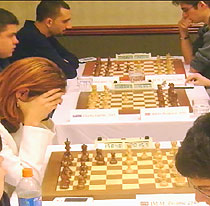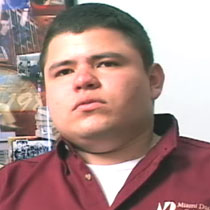-
(单词翻译:双击或拖选)
Washington
19 April 2007
Chess is one of the oldest and most popular games in the world. An estimated 45 million Americans play chess, and many universities and colleges have chess clubs or teams, even though chess competes for attention against scores of other campus activities. VOA's Brian Wagner tells us about a team of chess players in south Florida -- most of them immigrants from Cuba or other Latin American nations -- whose chessboard success has put their community college in the national spotlight1.

Students competing at the Final Four of Chess tournament
Most sports fan in the United States crave2 action, whether it is long passes in football or high jumps in extreme sports like BMX bicycle racing3. It is difficult for a game like chess to get the same kind of attention, says Renier Gonzalez, captain of the Miami Dade College chess team. "Actually, it's not even considered a sport in the U.S. But in other countries it is."
Renier and his teammates, however, take chess very seriously. Last month, the college's small team competed at the "Final Four of Chess" tournament. Miami Dade has been to the "Final Four of Chess" for the past four years, facing teams from several major universities. This year the team from the public school in south Florida finished third in the nation.
 |
| Charles Galofre |
Like many young players, Galofre began playing chess in the family, with an uncle in his native Colombia. In Miami, older players gather at a city park for games of chess and dominos -- popular pastimes in immigrant communities, especially the city's large Cuban population.
Chess players in Cuba begin serious study of the game at an early age.
Renier Gonzalez says he began chess training at age 11 in his home on the Communist-ruled island. "When I began playing chess, we only used books. But the same information you read in books, you can now find on the Internet."
More and more, chess students spend their time playing and learning on computers.
Charles Galofre says, "You don't always have the opportunity to play against players of certain abilities. The computer is great at punishing you for making mistakes, and I think it's ideal for getting more experience and practice."
Facing off against opponents at major competitions like the Final Four is key to developing a player's rating. And tournaments help generate interest in chess on campus, says the Miami Dade team's adviser6, Rene Garcia. "I've really been impressed with how the community has responded. Certainly we didn't expect it. We've had publicity7 we wouldn't have had otherwise, and it's good to know we're supported."
The team's recent success has already begun to generate interest among potential chess recruits. "It's going to be even better in four to five years,” says Gonzalez. “Now people recognize the program and they say, 'When I finish high school, I can go to the Miami Dade College program.’ Now people recognize us."
Later this year, chess fans can watch the college team compete at the Pan American college chess tournament, right on the Miami Dade campus.
 收听单词发音
收听单词发音
1
spotlight

|
|
| n.公众注意的中心,聚光灯,探照灯,视听,注意,醒目 | |
参考例句: |
|
|
|
2
crave

|
|
| vt.渴望得到,迫切需要,恳求,请求 | |
参考例句: |
|
|
|
3
racing

|
|
| n.竞赛,赛马;adj.竞赛用的,赛马用的 | |
参考例句: |
|
|
|
4
arduous

|
|
| adj.艰苦的,费力的,陡峭的 | |
参考例句: |
|
|
|
5
exhausted

|
|
| adj.极其疲惫的,精疲力尽的 | |
参考例句: |
|
|
|
6
adviser

|
|
| n.劝告者,顾问 | |
参考例句: |
|
|
|
7
publicity

|
|
| n.众所周知,闻名;宣传,广告 | |
参考例句: |
|
|
|















